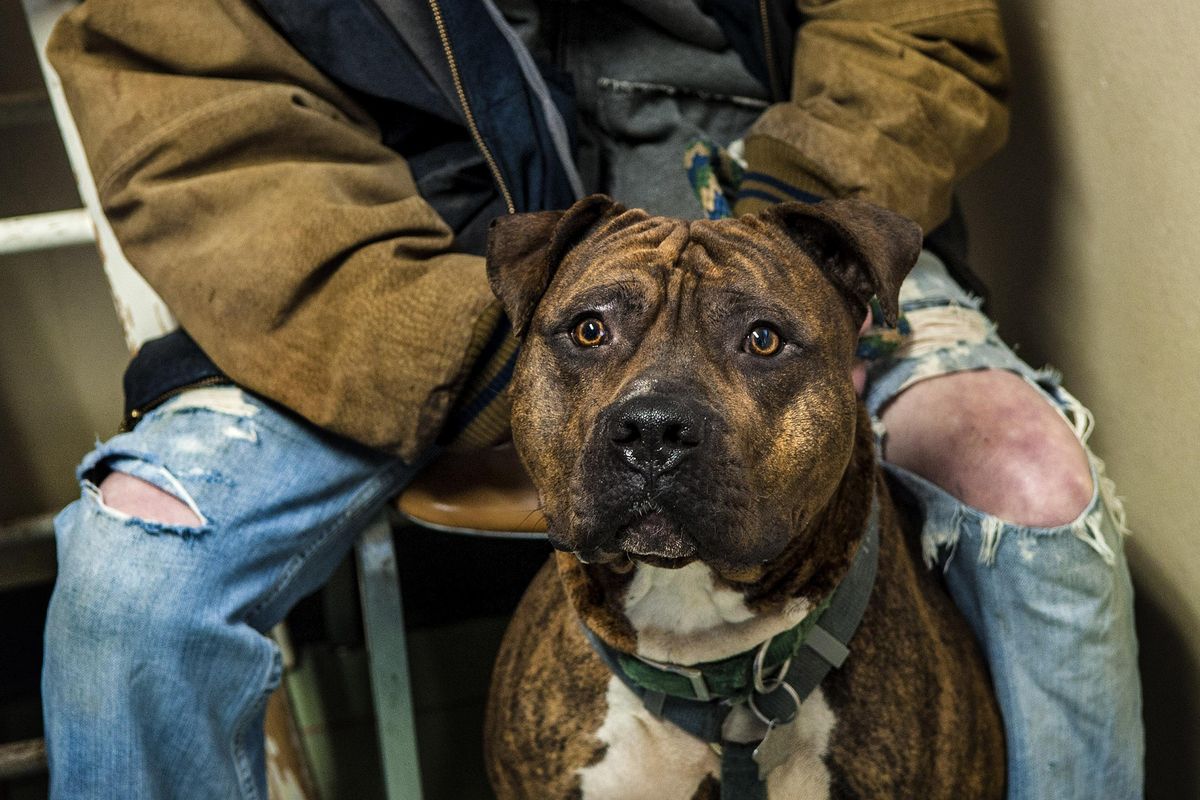Low-cost vet clinic at Union Gospel Mission keeps animals healthy and owners happy

Going to the vet is never easy, even when it’s a small, informal two-room suite attached to the Union Gospel Mission maintenance shop. Kitties were clawing and dogs shivered with nervousness Wednesday as they were examined as part of a low-cost vet clinic.
Andrea Figueroa and her boyfriend, Donnie Evans, brought in three 5-month-old cat siblings. Figueroa said they never knew the mother was pregnant. She is an indoor cat but she loves to escape and must have gotten pregnant when she was wandering, Figueroa said. “They were born in my closet,” she said. “It was a surprise.”
All three were there for their vaccinations and the boy, Jax, went into the back room to be neutered. The couple were given vouchers for low-cost spaying of the two female cats.
They heard about the vet clinic through a friend and are grateful to have a place to go to get affordable care. “It’s great,” Figueroa said. “We can take care of our pets in a proper way.”
The UGM vet clinic is open from 9 a.m. to noon on the first three Wednesdays of every month. People often line up starting at 7 a.m. to ensure that their pet is one of the dozen or so seen that day.
The clinic started as a table in the corner of the maintenance shop more than a decade ago, said volunteer Tammy Degraff. Dr. Denise Pilgeram runs the program and she and other volunteer vets give vaccines, examine sick animals and perform neuter operations. They cannot offer blood tests, dental care, laboratory services or X-rays.
“We’re not full service, but we can do a lot of things,” Pilgeram said.
Several local vet offices donate medications, pet food and other products. Some also offer discounted rates for more extensive treatment that the UGM clinic cannot provide. The clinic will often pay for part of the cost of additional treatment out of donated funds, Pilgeram said.
Last week she saw a dog that she suspected had tetanus. The dog was referred to a vet who treats both large and small animals, because the treatment is an equine antitoxin, Pilgeram said. “That was pretty unusual,” she said.
One of the frequent ailments they see is skin disease, likely because of low quality food, she said. They also see fleas, ear infections and bad teeth.
“That is one of the things we spend money on,” Pilgeram said of pet dental work.
Many services the clinic offers are free, though donations are requested. A fee of $10 is charged for neutering. The clinic does not get any funding from the mission, Pilgeram said, but gets only donations that are given directly to the clinic. Many donations come from the friends and family of the volunteer staff, Pilgeram said.
Degraff said pets help calm their owners and reduce stress. That can be key for people who are living in poverty. “You really see that when they bring them in,” she said. “That’s why these services are needed.”
Pilgeram said she volunteers several places, but loves her work helping pets at the UGM clinic.
“It’s just a feel-good thing and I think we fill a niche,” she said. “I think we’re seeing people who won’t go anywhere else.”
Nala, a pitbull/Australian shepherd mix, was nervous. The skin around her eye was pink and her owner, Lexie Hergert, was worried. She’d been watching the eye and cleaning it daily for weeks.
“It doesn’t seem like it’s getting better,” she said. “Now it’s got me worried.”
Hergert said she got Nala about a year ago and heard about the UGM clinic from a neighbor. “I can’t afford the regular vets,” she said. “It’s hard.”
As Pilgeram crouched down to pet Nala, the nervous dog snapped at her. Hergert put on a muzzle and Nala submitted to an exam and a nail trim. Pilgeram noted that the eye itself wasn’t red, but the skin around it was. “It doesn’t look like an eye infection,” she said.
Hergert was sent home with eye ointment and medication with instructions to come back in two or three weeks if it didn’t get better. Nala seemed relieved to get the muzzle off and Hergert was relieved that her dog would be OK.
“It really isn’t about pets, it’s about people,” Pilgeram said. “We alleviate a stress that can be alleviated.”